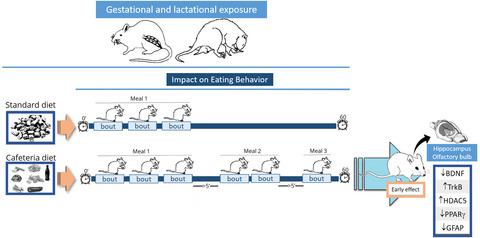当前位置:
X-MOL 学术
›
Int. J. Dev. Neurosci.
›
论文详情
Our official English website, www.x-mol.net, welcomes your
feedback! (Note: you will need to create a separate account there.)
Early life exposure to hypercaloric diet impairs eating behavior during weaning: The role of BDNF signaling and astrocyte marks
International Journal of Developmental Neuroscience ( IF 1.7 ) Pub Date : 2020-09-21 , DOI: 10.1002/jdn.10063 Roberta Passos Palazzo 1 , Iraci L S Torres 1, 2, 3 , Ágnis Iohana Grefenhagen 4 , Bruno Batista da Silva 4 , Louisiana Carolina Ferreira de Meireles 2 , Kethleen Costa de Vargas 4 , Zingara Alves 4 , Lenir Orlandi Pereira Silva 5 , Ionara Rodrigues Siqueira 1, 2, 4
International Journal of Developmental Neuroscience ( IF 1.7 ) Pub Date : 2020-09-21 , DOI: 10.1002/jdn.10063 Roberta Passos Palazzo 1 , Iraci L S Torres 1, 2, 3 , Ágnis Iohana Grefenhagen 4 , Bruno Batista da Silva 4 , Louisiana Carolina Ferreira de Meireles 2 , Kethleen Costa de Vargas 4 , Zingara Alves 4 , Lenir Orlandi Pereira Silva 5 , Ionara Rodrigues Siqueira 1, 2, 4
Affiliation

|
Literature shows that gestational and/or lactational exposure to hypercaloric diets induces long term effects on eating behavior and the involvement of neurochemical mechanisms. We hypothesized that the effects of hypercaloric diets in early development phases can precede an overweight or an obesity status. The aim of the present study was to evaluate the impact of gestational and lactational exposure to cafeteria diet on eating behavior and neurochemical parameters, BDNF signaling, epigenetic and astrocyte marks in the hippocampus and olfactory bulb during the weaning phase. Pregnant female rats were randomized between standard and cafeteria diet, the respective diet was maintained through the lactational period. The framework of feeding pattern, meal, and its microstructure, was observed in postnatal day 20. Exposure to cafeteria diet increased the number of meals, associated with a lower first inter‐meal interval and higher consumption in both genders, without any changes in body weight. Diet exposure also reduced the number of grooming, a behavior typically found at the end of meals. Hypercaloric diet exposure reduced BDNF levels in the olfactory bulb and hippocampus from rats of both sexes and increased the content of the TrkB receptor in hippocampi. It was observed an increase in HDAC5 levels, an epigenetic mark. Still, early exposure to the hypercaloric diet reduced hippocampal GFAP and PPARγ levels, without any effect on NeuN content, indicating that alterations in astrocytes can precede those neuronal outcomes. Our results showed that changes in interrelated neurochemical signaling, BDNF, and astrocyte marks, induced by hypercaloric diet in early stages of development may be related to impairment in the temporal distribution of eating pattern and consequent amounts of consumed food during the weaning phase.
中文翻译:

生命早期暴露于高热量饮食会损害断奶期间的饮食行为:BDNF 信号传导和星形胶质细胞标记的作用
文献表明,妊娠和/或哺乳期暴露于高热量饮食会对饮食行为和神经化学机制的参与产生长期影响。我们假设高热量饮食在早期发育阶段的影响可以先于超重或肥胖状态。本研究的目的是评估妊娠期和哺乳期暴露于食堂饮食对断奶期饮食行为和神经化学参数、BDNF 信号、海马和嗅球中的表观遗传和星形胶质细胞标记的影响。将怀孕的雌性大鼠随机分配在标准饮食和食堂饮食之间,各自的饮食维持到哺乳期。在出生后第 20 天观察喂养模式、膳食及其微观结构的框架。接触自助餐厅饮食会增加进餐次数,这与第一次进餐间隔较短和两性的消费量增加有关,而体重没有任何变化。饮食暴露也减少了梳理的次数,这种行为通常出现在用餐结束时。高热量饮食暴露降低了两性大鼠嗅球和海马中的 BDNF 水平,并增加了海马中 TrkB 受体的含量。观察到 HDAC5 水平增加,这是一种表观遗传标记。尽管如此,早期接触高热量饮食会降低海马 GFAP 和 PPARγ 水平,而对 NeuN 含量没有任何影响,这表明星形胶质细胞的改变可能先于这些神经元结果。我们的结果表明,相互关联的神经化学信号、BDNF 和星形胶质细胞标记的变化,
更新日期:2020-09-21
中文翻译:

生命早期暴露于高热量饮食会损害断奶期间的饮食行为:BDNF 信号传导和星形胶质细胞标记的作用
文献表明,妊娠和/或哺乳期暴露于高热量饮食会对饮食行为和神经化学机制的参与产生长期影响。我们假设高热量饮食在早期发育阶段的影响可以先于超重或肥胖状态。本研究的目的是评估妊娠期和哺乳期暴露于食堂饮食对断奶期饮食行为和神经化学参数、BDNF 信号、海马和嗅球中的表观遗传和星形胶质细胞标记的影响。将怀孕的雌性大鼠随机分配在标准饮食和食堂饮食之间,各自的饮食维持到哺乳期。在出生后第 20 天观察喂养模式、膳食及其微观结构的框架。接触自助餐厅饮食会增加进餐次数,这与第一次进餐间隔较短和两性的消费量增加有关,而体重没有任何变化。饮食暴露也减少了梳理的次数,这种行为通常出现在用餐结束时。高热量饮食暴露降低了两性大鼠嗅球和海马中的 BDNF 水平,并增加了海马中 TrkB 受体的含量。观察到 HDAC5 水平增加,这是一种表观遗传标记。尽管如此,早期接触高热量饮食会降低海马 GFAP 和 PPARγ 水平,而对 NeuN 含量没有任何影响,这表明星形胶质细胞的改变可能先于这些神经元结果。我们的结果表明,相互关联的神经化学信号、BDNF 和星形胶质细胞标记的变化,











































 京公网安备 11010802027423号
京公网安备 11010802027423号